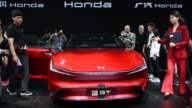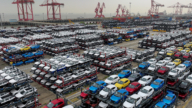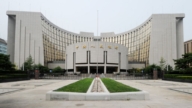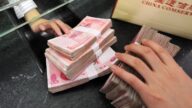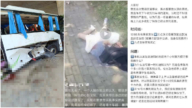【新唐人2014年05月06日訊】去年,中國新增委托貸款竄升為2萬5500億,成為房地產等產能過剩行業的主要資金來源。目前中國這種獨有的委托貸款形式,不只侷限在上市公司等,從銀行低息貸款後,再委托銀行高利放出貸款,銀行也在設法參與。專家指出,這種中國獨有的委托貸款,在增加實體經濟成本的同時,正形成多米諾骨牌效應擊垮中國經濟,最終還會導致大量印製鈔票,把危機轉嫁給民眾。
根據央行發行的《2013年社會融資規模統計數據報告》,去年,新增委托貸款竄升到2萬5500億,比2010年增長了190%多,在社會融資規模中躍居第二位。相當於全年新增人民幣貸款的29%。
據美國《華爾街日報》報導,能夠獲得信貸的大型上市公司,是委托貸款的踴躍提供者,這些企業不投資自己的核心業務,而是將手中資金以高於官方數倍的利率,借給資金緊缺的企業, 有的利率高達24.5%.
而銀行通常作為委托貸款的中間機構,向借貸雙方收取費用,中共央行的官員表示,在實踐中一些銀行已經將自己的資金偽裝成委托貸款,從而規避貸款方面的監管限制。
美國南卡羅萊納大學艾肯商學院教授謝田:「這也是在中國銀行出現錢荒,金融不健全,特權利益橫行這樣一個社會才會出現,其它正常國家,你很少見到一個公司它會去從事貸款業務,因為這不是它的業務範圍,也不是它所精通的,他們也不知道它的風險,公司即使有多餘的資金一般會用來自己的再發展,或自己的再投資。」
中國金融智庫研究員鞏勝利:「銀行沒有利潤可以賺,它才不做了,委托了以後,它把錢又讓人家來賺,高利潤來賺,它又贏得自己的好處,到了真正用錢的人手裡面都成了高息,第二、對這個市場形成了一種紊亂的錢流,第三點、很可能就還不起。」
據報導,這些委托貸款,大部份投資在房地產等產能過剩行業。2011年,中國大約有21%的委托貸款,流入房地產市場。
現在委托貸款正面臨大量違約。4月中旬,造船商「舜天船舶」披露,借給某地產開發商的9億元人民幣貸款,沒有收到對方應付的本金和利息。同一天,「洽洽食品」也宣佈正在進行一筆有關4千萬元人民幣貸款利息的訴訟。湖北「宜化化工」、「寧波波導」等上市公司,目前也都有借給地產商的委托貸款面臨違約。
謝田:「中國現在房地產市場的泡沫已經開始破滅,所以這一些巨額的高利貸很快也會跟著破滅,等於說把中國房地產業的風險和危機蔓延到其它行業去了,它實際上會造成全社會整體經濟的連鎖反應,隨著破產和危機擴展到全社會的各個角落。」
大陸經濟學者鄧先生:「風險我認為是全面的,整個社會現在各行各業都感受到這一點了,接下來就面臨節節敗退和破裂,產能過剩的釋放或者消化,接下來就是國家印錢來抵禦風險,銀行歷來抵消這些風險的結果就是逼著國家印錢、國家印鈔票,就是一種變相的搶劫。」
據報導,中國建設銀行是抵押貸款的領頭羊,去年末,「建行」委托貸款業務規模,達人民幣1萬4000億元。
另外,由於委托貸款風險,基本上是由委托人承擔,銀行在借款人審核、監督貸款的投放和收回上缺少動力,在委托貸款的監管上也會出現漏洞。
2006年,抵押貸款還遭到媒體抨擊,媒體聲稱抵押貸款是一片「灰色地帶」,特別是變相委托貸款,貓膩太多風險太大。銀行想貸款給某家房地產公司時,就會拉來另一家公司的存款,然後用委托貸款的名義貸出去。
不過從去年11月份開始,中共銀監會已經公開鼓勵銀行,用委托貸款等方式擴大兼併重組資金來源。
大陸經濟學家鄧先生指出,在市場萎縮、消費不振的情況下,加上委托貸款帶來的資金成本增加,沒有企業家再去經營實體,造成的社會危機會不可收拾。
採訪編輯/劉惠 後製/李智遠
Who Will Pay for Default Entrusted Loans in China?
Last year in China, the number of entrusted
loans increased by a net 2.55 trillion yuan.
The main source of these loans
are industries such as real estate.
Currently, this unique type of entrusted loan in
China is not only limited to the listed companies.
These companies took low-interest loans from a bank
and entrusted the bank to release it with high interest.
Now, banks are trying to get involved as well.
Experts point out that these entrusted loans may crash the
economy, because of a domino effect from increasing costs.
The subsequent crisis of mass printing money
will also be shifted to impact the general public.
According to China Central Bank’s 2013 Social
Financing Report, new entrusted loans increased
by a net 2.55 trillion yuan ($407.38 billion) last year.
This reflects a 190% increase from 2010, an equivalent
of 29% of all new yuan bank loans issued during the year.
WSJ reported that large, publicly traded
companies with access to credit, are among
the most active providers of entrusted loans.
These companies, instead of investing in their core
businesses, lend funds at hand to cash-strapped
businesses at several times the official interest rate.
Banks make money by charging fees to both
the lending company and the borrower.
However, in practice, some banks have disguised loans
made with their own capital as entrusted loans, thereby
helping them skirt regulatory limits on lending, reports WSJ.
Professor Frank Xie, School of Business,
University of South Carolina Aiken: “This
will only happen in a society like China.
In China, there is a shortage of money, an unhealthy
banking system, and rampant privileged interests.
This is rarely seen in a normal country, because
it is not what an ordinary company would do.
It is outside of its business core and profession,
with a risk that’s beyond its capacity.
Excess funds will be used for further
development or reinvestment."
Gong Shengli, researcher, Chinese Financial
think tank: “Banks won’t do it if there’s no profit.
They allow people to make high profits, but, it with
high interest rates to those who really need the money.
Secondly, it may create disorder
for the flow of money in the market.
Thirdly, it is possible that people
can’t afford to pay the loans back."
According to reports, these entrusted loans were mostly
invested in real estate and other overcapacity industries.
In 2011, about 21% of all entrusted
loans went into the property sector.
Now, these entrusted loans are facing a lot of default.
In mid-April, Sainty Marine said an
entrusted loan it made had gone bad.
A local property developer failed to
repay 90 million yuan, plus interest.
On the same day, Qiaqia Food also announced
an ongoing lawsuit over a 40 million yuan loan.
Listed companies such as Hubei Yihua Chemical
Industry, and China Bird are facing entrusted
loans defaults from real estate developers.
Professor Frank Xie: “Now China’s real estate is facing
the bubble bursting, and other huge usury bursts.
The spread of the real estate crisis to other industries
will cause a chain reaction in the entire economy.
It will lead to bankruptcy and
crisis in every corner of society."
Mr. Tang, economist: “I believe it
will be a comprehensive collapse.
Everybody can feel it now. The next stage will
be the release or digestion of this overcapacity.
More money will be printed to resist the risks.
That’s what the banks have pushed the
state to do. Printing money to offset risk.
However, money printing is disguised robbery."
It is said that the China Construction Bank
(CCB) is the leader of entrusted loans.
At the end of last year, CCB entrusted
loans reached 1.4 trillion yuan.
In addition, banks lack motivation to audit and supervise
loans, since the risk is basically borne by the clients.
Therefore, there might be loopholes
over supervision of entrusted loan.
In 2006, media criticized mortgage loans as a
grey industry, with too many pitfalls and risks.
This is especially so with disguised-loans.
The bank may loan a real estate company with money from
another company’s deposits, in the name of entrusted loans.
However, the China Banking Regulatory Commission
(CBRC) has publicly encouraged banks to enlarge
the merge and recombination of funding sources
through entrusted loans since last November.
Economist Mr Zheng says that with a shrinking
market, stagnant consumption, and increased
costs from entrusted loans, entrepreneurs
have given up on running real businesses.
Consequently, social crises will become unmanageable.
Interview & Edit/Liu Hui Post-Production/Li Zhiyuan



